Bolstering planetary biosecurity in an era of space exploration
Friday, 03 December 2021 00:06 The search of life beyond our world is an exciting venture that may yield an enormous discovery in the not-too-distant future. However, space agencies around the world, including NASA and the European Space Agency, have long been aware of the potential risks of biological contamination and have set in place planetary protection policies. In the face of increasing space missions, including those
The search of life beyond our world is an exciting venture that may yield an enormous discovery in the not-too-distant future. However, space agencies around the world, including NASA and the European Space Agency, have long been aware of the potential risks of biological contamination and have set in place planetary protection policies. In the face of increasing space missions, including those An eight-hour year
Friday, 03 December 2021 00:06 As far as extrasolar planets go, 'GJ 367 b' is a featherweight. With half the mass of Earth, the newly discovered planet is one of the lightest among the nearly 5000 exoplanets known today. It takes the extrasolar planet approximately eight hours to orbit its parent star. With a diameter of just over 9000 kilometres, GJ 367 b is slightly larger than Mars.
The planetary system is located ju
As far as extrasolar planets go, 'GJ 367 b' is a featherweight. With half the mass of Earth, the newly discovered planet is one of the lightest among the nearly 5000 exoplanets known today. It takes the extrasolar planet approximately eight hours to orbit its parent star. With a diameter of just over 9000 kilometres, GJ 367 b is slightly larger than Mars.
The planetary system is located ju SpaceX breaks annual launch record as it deploys 48 more Starlink satellites
Friday, 03 December 2021 00:02
SpaceX deployed 48 more satellites for its Starlink broadband constellation Dec. 2, along with two remote sensing spacecraft for BlackSky in a mission that breaks the record for Falcon 9 launches in a calendar year.
Spacewalking astronauts replace antenna after debris scare
Thursday, 02 December 2021 16:26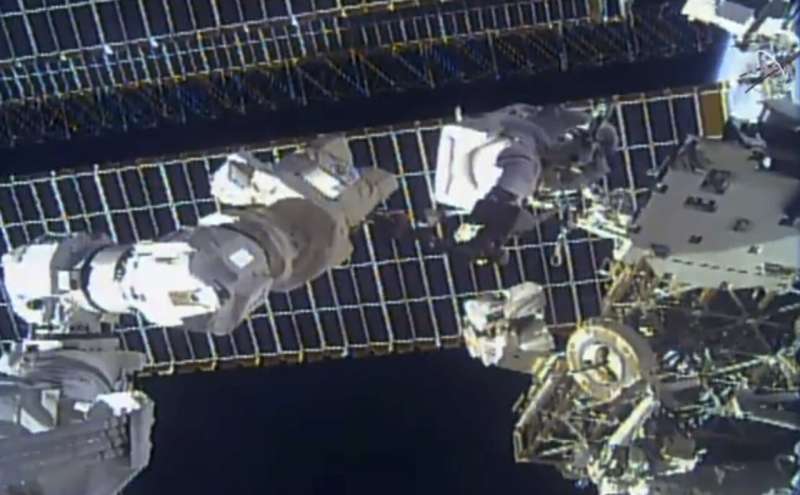
Spacewalking astronauts replaced a broken antenna outside the International Space Station on Thursday after getting NASA's all-clear for orbiting debris.
U.S. astronauts Tom Marshburn and Kayla Barron were supposed to complete the job Tuesday, but NASA delayed the spacewalk because of potentially threatening space junk. NASA later determined the astronauts were safe to go out, despite a slightly increased risk of a punctured suit from satellite wreckage.
Rocket Lab updates Neutron design
Thursday, 02 December 2021 15:57
Rocket Lab released new details Dec. 2 of the design of its Neutron medium-class rocket, a vehicle with a unique design the company says is intended to enable frequent and low-cost reuse.
Two versions of a Curiosity selfie: narrow and wide
Thursday, 02 December 2021 13:49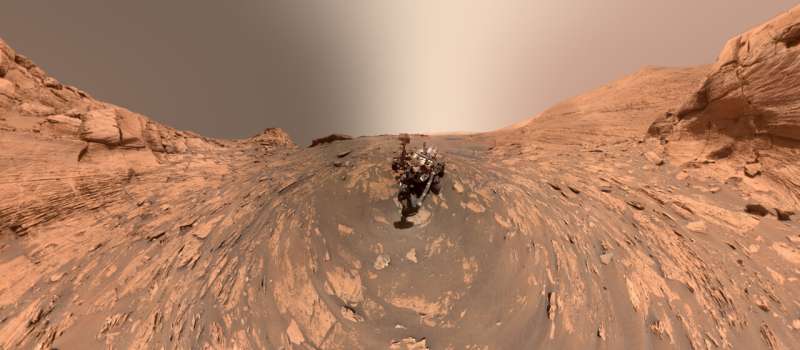
NASA's Curiosity Mars rover took this 360-degree selfie using the Mars Hand Lens Imager, or MAHLI, at the end of its robotic arm. The selfie comprises 81 individual images taken on Nov. 20, 2021—the 3,303rd Martian day, or sol, of the mission.
The rock structure behind the rover is "Greenheugh Pediment"; the hill that is middle distance on the right, is "Rafael Navarro Mountain." Curiosity is headed toward "Maria Gordon Notch," the U-shaped opening behind the rover to the left.
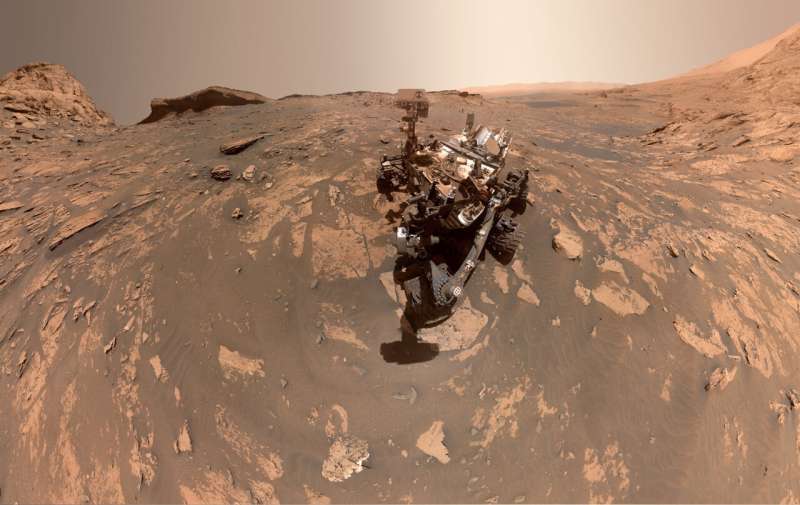
Explore further
A one-way phone call from Mars
Thursday, 02 December 2021 13:47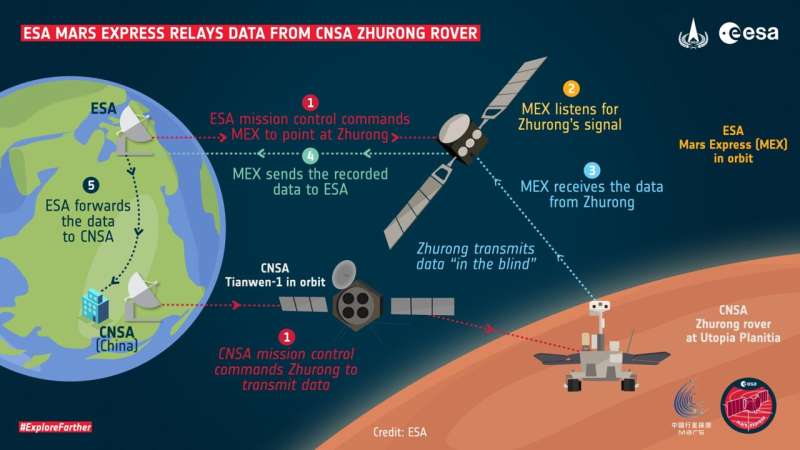
This November, ESA's Mars Express spacecraft carried out a series of experimental communication tests with the Chinese (CNSA) Zhurong Mars rover. Mars Express successfully caught data sent up 'in the blind' by the rover and relayed them to Earth where they were forwarded to the Zhurong team in China.
13:07 CET, 7 November, Utopia Planitia. The Zhurong rover, commanded by the Tianwen-1 orbiter, points its radio up at the Martian sky. Any minute now, ESA's Mars Express will begin to pass overhead. Zhurong starts transmitting a signal up into space. It has no way of knowing if its message is being received.
Landers and rovers on Mars gather data that help scientists answer fundamental questions about the geology, atmosphere, surface environment, history of water and potential for life on the Red Planet.
To get these insights to Earth, they first transmit the data up to spacecraft in orbit around Mars. These orbiters then use their much larger, more powerful transmitters to 'relay' the data across space to Earth.
"Normally, an orbiter like ESA's Mars Express first sends down a hail signal to a rover as a 'hello,'" says James Godfrey, Mars Express Spacecraft Operations Manager.
AFRL selects 10 universities for satellite program
Thursday, 02 December 2021 13:02 The Air Force Research Laboratory's University Nanosatellite Program (UNP) has selected 10 universities to participate in the upcoming 2-year partnership to design, fabricate and test small satellites.
At the recent Flight Selection Review for the program's tenth cycle, 3 of 10 universities were chosen to remain in the program and continue development of their CubeSats. These universities
The Air Force Research Laboratory's University Nanosatellite Program (UNP) has selected 10 universities to participate in the upcoming 2-year partnership to design, fabricate and test small satellites.
At the recent Flight Selection Review for the program's tenth cycle, 3 of 10 universities were chosen to remain in the program and continue development of their CubeSats. These universities DLR inaugurates its Institute for the Protection of Terrestrial Infrastructures
Thursday, 02 December 2021 13:02 Everyday life in an increasingly digitalised and connected world depends on functioning infrastructure. The economy and public life would quickly break down without working power grids, water supplies, hospitals and transport networks. The new German Aerospace Center (Deutsches Zentrum fur Luft- und Raumfahrt; DLR) Institute for the Protection of Terrestrial Infrastructures, located in Sankt Aug
Everyday life in an increasingly digitalised and connected world depends on functioning infrastructure. The economy and public life would quickly break down without working power grids, water supplies, hospitals and transport networks. The new German Aerospace Center (Deutsches Zentrum fur Luft- und Raumfahrt; DLR) Institute for the Protection of Terrestrial Infrastructures, located in Sankt Aug US Space Force raises alarm over China's orbital hypersonic weapons
Thursday, 02 December 2021 13:02 The Pentagon suggests that China tested a fractional orbital bombardment system (FOBS) earlier this year. According to US military observers, China's alleged new orbital hypersonic glide vehicle weapon poses a huge challenge to the Pentagon since the US does not have active countermeasures to these arms.
China's new hypersonic weapon system is orbital in nature and could be able to stay in
The Pentagon suggests that China tested a fractional orbital bombardment system (FOBS) earlier this year. According to US military observers, China's alleged new orbital hypersonic glide vehicle weapon poses a huge challenge to the Pentagon since the US does not have active countermeasures to these arms.
China's new hypersonic weapon system is orbital in nature and could be able to stay in Lead 'em then leave 'em: tech founders who quit
Thursday, 02 December 2021 13:02 Former Twitter CEO Jack Dorsey joins a long list of tech gurus who've quit the companies they founded. But what makes them step aside - and is it good for business?
From Microsoft's Bill Gates to Amazon's Jeff Bezos, most of the people who created the Silicon Valley giants that dominate our lives have since handed the reins to someone else.
"There's a lot of talk about the importance o
Former Twitter CEO Jack Dorsey joins a long list of tech gurus who've quit the companies they founded. But what makes them step aside - and is it good for business?
From Microsoft's Bill Gates to Amazon's Jeff Bezos, most of the people who created the Silicon Valley giants that dominate our lives have since handed the reins to someone else.
"There's a lot of talk about the importance o Dragons-Eye View
Thursday, 02 December 2021 13:02 It can be hard to appreciate that a human-made, football-pitch-sized spacecraft is orbiting 400 km above our heads, but there it is.
The jewel of human cooperation and ingenuity that is the International Space Station shines brightly in this image captured by ESA astronaut Thomas Pesquet from the SpaceX Crew Dragon Endeavour.
Crew-2 got these amazing views during a flyaround of the o
It can be hard to appreciate that a human-made, football-pitch-sized spacecraft is orbiting 400 km above our heads, but there it is.
The jewel of human cooperation and ingenuity that is the International Space Station shines brightly in this image captured by ESA astronaut Thomas Pesquet from the SpaceX Crew Dragon Endeavour.
Crew-2 got these amazing views during a flyaround of the o Asteroid material deposited during large impacts record the moon's ancient magnetic field
Thursday, 02 December 2021 13:02 The moon has no core dynamo magnetic field, but spacecraft detect numerous strong localized magnetic fields in the crust of the moon. Many of these magnetic anomalies are antipodal to large impact basins.
Scientists at Purdue University and the University of California, Santa Cruz, led by Brandon Johnson, Purdue associate professor of earth, atmospheric, and planetary sciences, ran impact
The moon has no core dynamo magnetic field, but spacecraft detect numerous strong localized magnetic fields in the crust of the moon. Many of these magnetic anomalies are antipodal to large impact basins.
Scientists at Purdue University and the University of California, Santa Cruz, led by Brandon Johnson, Purdue associate professor of earth, atmospheric, and planetary sciences, ran impact Rocket Lab launch strengthens BlackSky Constellation by two satellites
Thursday, 02 December 2021 13:02 BlackSky has added two satellites to its constellation following the Rocket Lab "Love at First Insight" launch from Rocket Lab Launch Complex 1 on November 18. The satellites were fully operational and commercially available within six days of launch.
"This was the fastest BlackSky dual-satellite commissioning process in the company's history," said Nick Merski, BlackSky chief operations o
BlackSky has added two satellites to its constellation following the Rocket Lab "Love at First Insight" launch from Rocket Lab Launch Complex 1 on November 18. The satellites were fully operational and commercially available within six days of launch.
"This was the fastest BlackSky dual-satellite commissioning process in the company's history," said Nick Merski, BlackSky chief operations o 

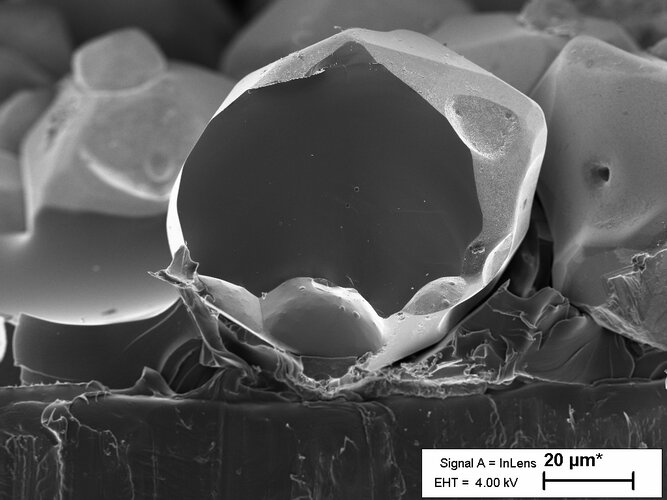 Image:
Tiny crystal of power
Image:
Tiny crystal of power